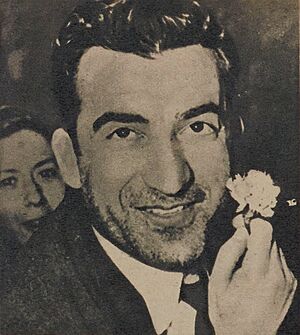Nikos Beloyannis facts for kids
Quick facts for kids
Nikos Beloyannis
|
|
|---|---|
 |
|
| Personal details | |
| Born | December 22, 1915 Amaliada, Greece |
| Died | March 30, 1952 (aged 36) Goudi, Athens, Greece |
| Political party | Communist Party of Greece |
| Domestic partner | Elli Pappa |
| Occupation | Politician, political commissar |
| Military service | |
| Branch/service | |
| Years of service | 1946-1949 (Democratic Army of Greece) 1943-1945 (Greek People's Liberation Army) |
| Rank | Political commissar |
| Unit | 10th Division (Democratic Army of Greece) 9th Regiment (Greek People's Liberation Army) |
| Battles/wars |
|
Nikos Beloyannis (Greek: Νίκος Μπελογιάννης; 1915 – 30 March 1952) was a Greek leader and an important member of the Greek Communist Party. He is remembered for his role in the Greek Resistance during World War II and the Greek Civil War.
Contents
Early Life and Political Actions
Nikos Beloyannis was born in Amaliada, a town in Peloponnese, Greece, in 1915. He came from a family that was quite well-off. He began studying law in Athens.
However, before he could finish his studies, he was arrested. This happened in the 1930s under the government of Ioannis Metaxas. He was held in Akronauplia prison.
When Germany and its allies took over Greece in 1941, Beloyannis was handed over to the Germans.
Joining the Resistance
In 1943, Nikos Beloyannis managed to escape from prison. He then joined the Greek People's Liberation Army (ELAS). This group was fighting against the Nazi occupation. He worked with Aris Velouchiotis in the Peloponnese region.
After World War II, Greece faced a civil war. Beloyannis became a political leader for the Democratic Army of Greece (DSE). This group was on the side of the communists. When the civil war ended in 1949, he was one of the last people to leave the country.
Return to Greece and Trial
In June 1950, Beloyannis secretly returned to Greece. His goal was to help rebuild the Communist Party of Greece (KKE) in Athens. At that time, the KKE was not allowed to operate by the government.
On December 20, 1950, he was arrested. He was put on trial by a military court. He was accused of breaking a law that made the KKE illegal. He was also accused of sharing information with the Soviet Union.
The Beloyannis Trial
The trial began in Athens on October 19, 1951. A total of 94 people were accused in this case. One of the judges was Georgios Papadopoulos. He later became the leader of a military government in Greece from 1967 to 1974.
Beloyannis strongly denied all the accusations against him. He emphasized that his actions during the anti-Nazi resistance (1941–1944) were patriotic. He also spoke about the British involvement (1944–1946) and the Greek Civil War (1946–1949).
He became known around the world as the "Man with the Carnation." The famous artist Pablo Picasso even drew a sketch of him with a carnation. Beloyannis argued that people who fought against the Nazis were being punished for their left-wing views after the war. Meanwhile, some who had helped the Nazis were given jobs in the Greek government. This happened because of the tense political situation known as the Cold War.
Appeals and Execution
Many people in Greece and around the world asked for Beloyannis to be spared. Despite these appeals, the military court sentenced Beloyannis and eleven others to death in November.
On March 1, 1952, Beloyannis and seven others were again sentenced to death. Within a week, the Greek government received hundreds of thousands of messages from all over the world. These messages protested the death sentences. Famous people like Picasso, Charlie Chaplin, Jean Paul Sartre, and Nazim Hikmet joined a campaign asking for the court's decision to be changed.
However, on the morning of Sunday, March 30, 1952, four prisoners, including Beloyannis, were taken from Kallithea. They were executed at the Goudi camp. The sentences for the other people accused with Beloyannis were changed to life in prison. By the mid-1960s, all of them had been released.
Beloyannis was one of the most well-known Greeks connected to the Soviet Union after World War II. A village in Hungary was named Beloiannisz after him. This village was a home for Greek refugees who left Greece after the civil war. They were allowed to return to Greece in the early 1980s.
Writings and Legacy
In his final letter, written while he was on death row, Beloyannis mentioned two books he had written. One was about Greece's economic development. The other was about the country's history of literature.
The book about economics was published in 2010. Its title is Foreign Capital in Greece (Το Ξένο Κεφάλαιο στην Ελλάδα, To Kseno Kefaleo stin Ellada). In this book, Beloyannis looked closely at how Greece borrowed money from other countries. He showed how this borrowing led to foreign powers and banks controlling much of Greece's economy and resources. He believed this was harmful to the working people of Greece.
See also
- Elli Pappa (1920–2009), a Greek writer and activist who was Nikos Beloyannis's partner.
- Beloiannisz, a village in Hungary named after him.
Images for kids
 | Selma Burke |
 | Pauline Powell Burns |
 | Frederick J. Brown |
 | Robert Blackburn |


